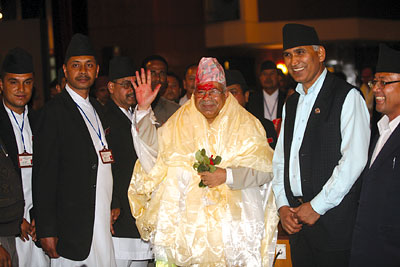 KIRAN PANDAY |
In theory, the Nepali state governs over a territory with more than 27 million citizens. Its broad mandate, as laid out in the country's laws, policies and plans, is to provide housing, education, health, jobs, food, security, justice, freedoms and rights for all Nepalis, besides settling disputes and building a cohesive national identity.
Now, go to any CDO office, or sit with VDC secretaries loitering around in the district headquarters. They spend a large portion of their days signing papers and certificates for citizens. The CDO is often in fire-fighting mode vis-�-vis political party leaders in the district, deals with people with grievances, entertains visitors from Kathmandu, and attends events. As the fiscal year ends, his office is busy finalising expenditure, giving out contracts, and allotting funds.
In practice, the state's functions essentially include maintaining a degree of law and order; dispensing patronage and money to politically influential individuals; ensuring coordination between its various agencies to run a few schools and the district hospital; providing citizens with formal documents; and carrying on the pomp and ceremony of officialdom.
This disjunction between what the state is supposed to do, and what it does or can do, is at the root of Nepal's political and governance crisis.
If you judge its performance based on what it aspires to do, the Nepali state comes across as a hollow entity. It barely manages to complete minimal tasks, let alone meet the enhanced aspirations of its citizens. Its abysmal performance explains the widespread political discontent and the existence of numerous small rebel groups. But the state, in its various avatars, is extremely resilient and has found ways to survive. It has learnt the art of crisis management, based on a network of strong politicians, bureaucrats, small businessmen, big to mid-sized landowners, NGOs, and local media. It can maintain systemic stability even in the face of sporadic killings and abductions.
But the fundamental reason it can maintain legitimacy and deal with threats is because millions of citizens have, for all practical purposes, seceded from the Nepali state.
A lot has been written about how the migration of workers to India, Malaysia and the Gulf has kept the Nepali economy afloat. But there is an interrelated point. Migration has helped the Nepali state remain intact. For emigrants, their only interaction with the government is when they have to prepare their citizenship papers and passports; it is the transnational terrain of manpower agencies, airlines, and foreign companies that makes up their world.
Those in government readily admit that this provides a 'safety valve' against the unmanageable political unrest that would have resulted had these hundreds of thousands of unemployed men and women stayed in the villages still. Those who have fought the state, especially the Maoists, confirm the truth of this.
Dr Baburam Bhattarai says that migration made it tougher to destroy the 'semi-feudal' nature of the rural economy. A young man goes abroad; his parents and wife work on the fields as landless labourers. But his income provides them with a cushion, and reduces incentives for them to rebel against local power structures. This realisation was probably a factor in the Maoists mobilising support and funds from Nepali workers abroad during the insurgency.
The discussion over state restructuring is futile as long as the gap between its aspirations and delivery capacity, and the role of what can be termed the new transnational Nepali proletariat, are not taken into account. If there is no alternative but to be an exporter of cheap labour for the rest of the world, let us focus on building mechanisms that address the concerns of this primary lifeline. But if there is recognition that this is not sustainable or desirable, then the Nepali state has to change its focus to create more jobs within. Both tracks could be pursued simultaneously, but policymakers would do well to remember their hopeless track record in multi-tasking. The state needs to figure out what its broader objective is beyond survival, before it decides what it wants to look like.
Editor's note: Effective this week, CK Lal's Fourth Estate column will appear fortnightly.
READ ALSO:
The wages of sin, Publisher's note
Spectacle, not speculation, Rabi Thapa
Vacancy, Nepal, Artha Beed
FIFA fo fum, Ass



